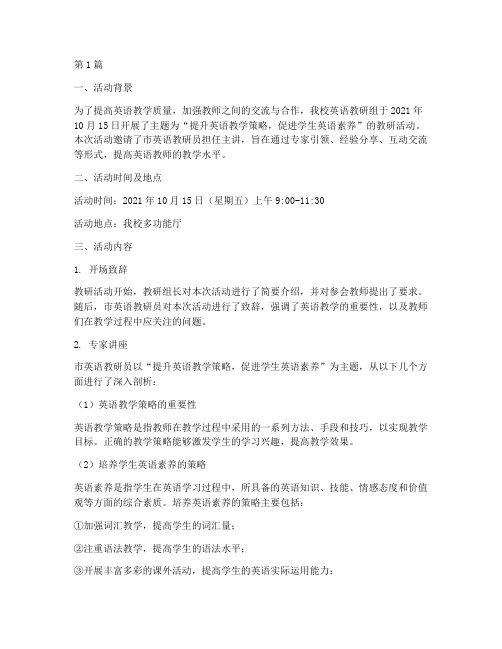英语学科组活动记录
小学英语组教研活动记录(3篇)

第1篇一、活动时间:2021年10月15日二、活动地点:小学英语教研室三、活动主题:小学英语课堂有效教学策略研究四、活动主持人:张老师五、活动参与人员:小学英语组全体教师六、活动内容:1. 主持人介绍本次教研活动主题和目的2. 分享优秀教学案例3. 分析小学英语课堂常见问题及解决策略4. 小组讨论,交流教学心得5. 教研组长总结发言七、活动过程:1. 主持人介绍本次教研活动主题和目的张老师首先对本次教研活动的主题进行了简要介绍,强调本次教研活动旨在提高小学英语课堂的有效教学,促进教师之间的交流与合作。
2. 分享优秀教学案例李老师分享了一节优秀的教学案例,通过PPT展示,详细介绍了该案例的设计思路、教学过程、课堂效果等。
在分享过程中,李老师重点强调了以下几点:(1)关注学生个体差异,因材施教;(2)注重培养学生的英语听说能力;(3)创设真实、有趣的情境,激发学生学习兴趣;(4)加强课堂互动,提高学生参与度。
3. 分析小学英语课堂常见问题及解决策略王老师针对小学英语课堂中常见的问题进行了分析,并提出了相应的解决策略。
以下是部分问题及策略:(1)问题:部分学生对英语学习缺乏兴趣。
解决策略:创设生动、有趣的课堂氛围,激发学生学习兴趣;关注学生个体差异,因材施教。
(2)问题:学生的英语听说能力较弱。
解决策略:加强课堂互动,提高学生参与度;利用多媒体资源,创设真实、有趣的情境;开展英语角、英语比赛等活动,提高学生的英语听说能力。
(3)问题:教师教学方式单一,课堂氛围沉闷。
解决策略:丰富教学手段,运用多种教学方法;关注学生的情感需求,营造轻松、愉快的课堂氛围。
4. 小组讨论,交流教学心得在主持人带领下,教师们分为四个小组,针对以上问题及解决策略进行讨论。
讨论过程中,教师们积极发言,分享自己的教学心得和经验。
以下是部分讨论内容:(1)教师A:在课堂上,我注重创设情境,让学生在真实语境中学习英语。
同时,我还利用多媒体资源,让学生在观看图片、视频等过程中,提高英语听说能力。
英语组常规教研活动记录(3篇)

第1篇Date: March 15, 2023Location: School Library, Main BuildingTime: 2:00 PM - 4:30 PMParticipants: English Department Faculty, Guest Speakers, Administrative StaffFacilitator: Mr. John Smith, Head of English Department---I. IntroductionThe English Department held its monthly research and teaching activity on March 15, 2023, in the school library. The objective of this meeting was to discuss recent educational trends, share innovative teaching methods, and address any challenges faced by faculty members in the department. The session was attended by all English faculty members, along with guest speakers from other departments and administrative staff.---II. Welcome and Opening RemarksThe session commenced with a warm welcome from Mr. John Smith, the Head of the English Department. He emphasized the importance of continuous professional development and the role of research in enhancing teaching practices. Mr. Smith highlighted the significance of the meeting and expressed his hope that it would be a productive and insightful session for all participants.---III. Presentation on Educational TrendsThe first presentation was given by Dr. Emily Johnson, an educational psychologist from the Psychology Department. Dr. Johnson spoke about thelatest trends in education, including the increasing emphasis on personalized learning, the integration of technology in the classroom, and the importance of fostering critical thinking skills among students. She provided practical examples of how these trends could be incorporated into English language teaching.Key Points:- Personalized learning: Tailoring instruction to meet individual student needs.- Technology integration: Utilizing digital tools to enhance learning experiences.- Critical thinking: Developing students' ability to analyze and evaluate information.---IV. Panel Discussion on Innovative Teaching MethodsA panel discussion followed, featuring three faculty members who shared their experiences with innovative teaching methods. Mr. David Lee, who teaches Advanced Placement English Literature, discussed the use of flipped classrooms to promote student engagement. Mrs. Sarah Chen, an English as a Second Language (ESL) instructor, shared her success with project-based learning in her classes. Ms. Lily Wang, who teaches English Language Arts (ELA), spoke about the implementation of interactive whiteboards to create a more dynamic learning environment.Key Points:- Flipped classrooms: Reversing traditional teaching methods to allowfor more in-depth exploration of topics.- Project-based learning: Encouraging students to apply their knowledge to real-world scenarios.- Interactive whiteboards: Utilizing technology to enhance classroom interaction and collaboration.---V. Addressing Challenges in TeachingThe session then shifted to a roundtable discussion where faculty members shared the challenges they faced in their teaching practices. Topics included managing diverse classrooms, incorporating diverse perspectives in literature, and dealing with student disengagement. The panel of guest speakers provided insights and suggestions to help overcome these challenges.Key Points:- Managing diverse classrooms: Implementing inclusive teachingstrategies that cater to different learning styles.- Incorporating diverse perspectives: Utilizing diverse literature to reflect the multicultural nature of society.- Dealing with student disengagement: Engaging students through interactive activities and real-world connections.---VI. Sharing of Best PracticesThe final part of the session was dedicated to sharing best practices among faculty members. Each participant was asked to share one effective teaching technique or strategy that they had recently implemented. This led to a lively exchange of ideas and a wealth of resources that could be adapted by others in the department.Key Points:- Use of interactive reading activities to enhance comprehension.- Incorporating current events into the curriculum to make learning relevant.- Encouraging student-led discussions to promote critical thinking.---VII. Conclusion and Next StepsMr. John Smith concluded the session by summarizing the key points discussed and thanking all participants for their contributions. He emphasized the importance of collaboration and continuous improvement in the English Department. He also announced the upcoming workshops and training sessions that would be offered to faculty members to further their professional development.Next Steps:- Implementation of suggested teaching strategies and practices.- Regular follow-up meetings to discuss progress and address any new challenges.- Participation in professional development workshops and training sessions.---VIII. AdjournmentThe session concluded at 4:30 PM with a sense of accomplishment and renewed enthusiasm for teaching. The English Department looks forward to continued collaboration and improvement in the upcoming months.第2篇Date: March 15, 2023Location: School LibraryTime: 3:00 PM - 5:00 PMAttendees: All English teachers in the departmentFacilitator: Ms. Smith, Head of the English Department---I. IntroductionThe English Department held its regular research and teaching activityon March 15, 2023, in the school library. The purpose of this meeting was to discuss current teaching strategies, share innovative ideas, and address any challenges faced by the teachers in their classrooms. The meeting was facilitated by Ms. Smith, the Head of the English Department, who ensured a productive and engaging session.---II. Opening RemarksMs. Smith began the meeting with a brief overview of the agenda for the day. She emphasized the importance of continuous professional development and the need for collaboration among the English faculty to enhance the quality of teaching and learning in the department.---III. Current Teaching Strategies1. Discussion on Flipped Classroom Methodology:- Ms. Johnson shared her experience with implementing the flipped classroom approach in her classes. She highlighted the benefits, such as increased student engagement and improved understanding of complex concepts.- Mr. Lee suggested integrating multimedia resources and interactive online platforms to make the flipped lessons more engaging for students.- Ms. Smith encouraged the team to experiment with different flipped classroom models and to share their findings with the department.2. Use of Technology in Language Learning:- Ms. Brown presented a case study on how she incorporated technology tools like Kahoot! and Quizlet into her vocabulary lessons, which resulted in higher student participation and better retention of information.- Mr. Wang shared his success with using virtual reality (VR) to simulate real-life scenarios for language practice, which he found to be particularly effective for students learning English as a second language.---IV. Sharing of Innovative Ideas1. Integrating Literature into Language Classes:- Ms. Liu proposed a new initiative where students would read a classic novel each semester and discuss it in class. She believed this would help improve students' critical thinking skills and appreciation for literature.- Mr. Zhang suggested creating a virtual book club where students could share their thoughts and insights on the novels online, fostering a sense of community and collaboration.2. Project-Based Learning (PBL):- Ms. Patel shared her experience with PBL in her advanced English classes. She explained how students worked in groups to completeprojects related to current events or global issues, which not only improved their language skills but also enhanced their teamwork and research abilities.- Ms. Smith commended Ms. Patel's approach and encouraged other teachers to consider implementing PBL in their classrooms.---V. Addressing Challenges1. Student Motivation:- Ms. Smith recognized that maintaining student motivation can be a challenge, especially with students who are not native speakers. She suggested offering incentives for participation and setting clear learning objectives to keep students engaged.- Mr. Green proposed a reward system where students who consistently demonstrate improvement in their language skills receive recognition, which could be in the form of certificates or small prizes.2. Classroom Management:- Several teachers expressed concerns about classroom management, particularly when dealing with large classes. Ms. Smith recommended using seating charts and assigning student roles to help manage the classroom effectively.- Ms. Davis suggested using group activities and pair work to keep students engaged and reduce the likelihood of disruptive behavior.---VI. Group Work and FeedbackThe teachers were divided into small groups to discuss the following topics:- How to effectively integrate technology into language classes.- Strategies for improving student engagement and motivation.- Best practices for classroom management.Each group presented their findings and received feedback from the rest of the department. The discussions were lively, and many practical solutions were proposed.---VII. Closing RemarksMs. Smith concluded the meeting by thanking all participants for their contributions and emphasizing the importance of ongoing collaboration and support within the department. She encouraged teachers to continue sharing their ideas and experiences and to support each other in their professional growth.---End of MeetingThe regular research and teaching activity concluded at 5:00 PM. The English Department looks forward to the next meeting, where they will continue to explore new strategies and solutions to enhance the learning experience for their students.第3篇Date: [Insert Date]Location: [Insert Location]Participants: [List of Participants]Facilitator: [Name of Facilitator]Minutes Taker: [Name of Minutes Taker]---I. IntroductionThe English Department held its regular research and teaching activity on [Insert Date] at [Insert Location]. The purpose of this meeting was to discuss recent educational trends, share best practices, and address any challenges faced by the department. The meeting was attended by [number] members of the English Department, including teachers, teaching assistants, and administrative staff.---II. Welcome and Opening RemarksThe meeting was opened by [Name of Facilitator], who welcomed all participants and expressed gratitude for their dedication and commitment to the department. [Name of Facilitator] emphasized the importance of continuous professional development and the role of regular教研activities in enhancing the quality of teaching and learning in the English Department.---III. Presentation on Recent Educational Trends[Name of Presenter] gave a presentation on the latest educational trends, focusing on the integration of technology in language teaching. The presentation highlighted the following key points:1. Flipped Classroom: This approach encourages students to learn outside the classroom, using online resources and materials, while classroomtime is used for interactive activities and discussions.2. Project-Based Learning (PBL): PBL involves students in real-world projects that require them to apply their language skills in practical contexts.3. Gamification: Incorporating game-like elements into language learning can increase motivation and engagement among students.4. Digital Literacy: Teaching students how to effectively navigate and critically evaluate digital content is essential in the modern digital age.[Name of Presenter] encouraged the department to explore these trendsand consider how they could be integrated into their teaching practices.---IV. Sharing of Best PracticesThe next segment of the meeting was dedicated to sharing best practices. Each participant had the opportunity to share a teaching strategy or activity that had been successful in their classroom. The following best practices were discussed:1. Interactive Whiteboards: [Name of Teacher] shared how the use of interactive whiteboards has enhanced student participation and engagement in lessons.2. Student-Centered Discussions: [Name of Teacher] described how implementing student-centered discussions has improved critical thinking skills and allowed students to practice speaking and listening skills.3. Homework Assignments: [Name of Teacher] discussed the effectiveness of assigning personalized homework tasks that cater to individual student needs.4. Collaborative Learning: [Name of Teacher] highlighted the benefits of collaborative learning activities, such as group projects and peer teaching.---V. Addressing ChallengesThe group then engaged in a discussion about the challenges they face in their teaching. Some of the challenges mentioned included:1. Diverse Learning Styles: The need to cater to a diverse range of learning styles and abilities among students.2. Classroom Management: Strategies for managing large classes and maintaining a productive learning environment.3. Assessment: Developing effective and fair assessment methods that accurately measure student learning.4. Time Management: Balancing the demands of teaching, grading, and professional development.Participants shared their strategies for overcoming these challenges and offered support to each other.---VI. Workshops and Professional Development Opportunities[Name of Facilitator] informed the group about upcoming workshops and professional development opportunities that could help address some of the challenges discussed. These included:1. Workshop on Classroom Management: A one-day workshop on effective classroom management strategies.2. Professional Development Series: A series of webinars on various topics related to language teaching.3. Teacher Exchange Program: An opportunity for teachers to observe and learn from colleagues in other schools.Participants expressed interest in participating in these opportunities and discussed how they could be integrated into the department's professional development plan.---VII. Closing RemarksThe meeting was concluded with a summary of the key points discussed and a reminder of the importance of ongoing collaboration and support within the department. [Name of Facilitator] thanked all participants for their active participation and encouraged them to continue sharing their ideas and experiences.---VIII. Next Steps1. Implementation of Best Practices: Participants will implement atleast one new teaching strategy or activity in their classrooms and share their experiences with the group in the next meeting.2. Professional Development Plan: The department will create a professional development plan based on the workshops and opportunities discussed.3. Follow-Up Meeting: A follow-up meeting will be scheduled to discuss the progress made and any further challenges encountered.---End of MeetingThe regular research and teaching activity of the English Department concluded with a sense of unity and determination to improve the quality of education provided to students. The meeting was a valuableopportunity for collaboration and professional growth, and participants left feeling inspired and motivated to continue their efforts in enhancing the English language learning experience.---Minutes Taker’s Note:The meeting was productive and insightful. The participants demonstrated a strong commitment to their roles and the students they serve. The suggestions and ideas shared will undoubtedly contribute to the department's ongoing success.。
期末教研英语活动记录(3篇)

第1篇活动时间:2023年6月15日活动地点:学校多功能厅参与人员:英语教研组全体教师活动主题:期末英语教学质量提升与反思活动记录:一、活动开场上午9点,英语教研组全体教师准时到达多功能厅,活动在轻松愉快的氛围中开始。
首先,教研组长李老师对本次活动的目的和意义进行了简要介绍,强调了期末教学质量提升的重要性,并期待通过本次教研活动,共同探讨提升教学质量的有效途径。
二、教学经验分享1. 张老师分享张老师以“如何在期末复习阶段提高学生英语听力水平”为主题,分享了自己的教学经验。
她提到,在复习阶段,教师应注重培养学生良好的听力习惯,通过多种听力材料,如英语歌曲、电影片段等,激发学生的学习兴趣。
同时,张老师还强调了课堂互动的重要性,鼓励学生在课堂上积极发言,提高听力反应速度。
2. 王老师分享王老师针对“如何提高学生英语口语表达能力”这一话题,分享了她的教学心得。
她认为,在口语教学中,教师应注重培养学生的语感和语调,通过角色扮演、小组讨论等形式,让学生在轻松愉快的氛围中提高口语水平。
此外,王老师还强调了教师自身口语表达能力的提升,以身作则,为学生树立良好的榜样。
3. 刘老师分享刘老师针对“如何有效提高学生英语写作能力”进行了经验分享。
她提到,在写作教学中,教师应注重培养学生的思维能力,通过分析范文、总结写作技巧等方式,帮助学生掌握英语写作的基本规律。
同时,刘老师还强调了批改作文的重要性,及时反馈,帮助学生发现并改正错误。
三、教学反思与讨论在经验分享环节结束后,全体教师针对期末教学进行了反思与讨论。
大家纷纷结合自身教学实践,提出了以下问题:1. 如何在短时间内提高学生的英语成绩?2. 如何激发学生的学习兴趣,提高课堂参与度?3. 如何针对不同层次的学生,制定个性化的教学方案?4. 如何提高教师自身的专业素养,更好地服务于教学?针对这些问题,老师们进行了深入的探讨,并提出了以下建议:1. 制定科学合理的复习计划,确保复习内容全面、系统。
英语组教研计划活动记录(3篇)

第1篇活动时间:2023年3月15日活动地点:学校多功能厅参与人员:英语组全体教师活动主持人:张老师一、活动背景为了进一步提升我校英语教学质量,提高教师的专业素养和教学能力,英语组特制定本教研计划,并定期开展教研活动。
本次教研活动旨在通过集体备课、教学观摩、经验分享等形式,促进教师之间的交流与合作,共同探讨提高英语教学效率的方法。
二、活动目标1. 通过集体备课,提高教师对教材的理解和把握能力。
2. 通过教学观摩,促进教师之间的相互学习和借鉴。
3. 通过经验分享,拓宽教师的教学思路,提高教学效果。
4. 增强教师团队凝聚力,形成良好的教研氛围。
三、活动内容1. 集体备课- 主题:探讨如何有效提高学生英语口语表达能力。
- 过程:首先,由张老师介绍本次集体备课的主题和目标。
接着,各位教师结合自己的教学经验,就如何设计课堂活动、如何激发学生学习兴趣、如何培养学生的口语表达能力等方面进行讨论。
最后,张老师对大家的讨论进行总结,并形成一份详细的备课方案。
2. 教学观摩- 主题:观摩优秀教师的课堂,学习其教学方法和技巧。
- 过程:由李老师展示一节精彩的英语课。
课后,观摩教师们就李老师的课堂设计、教学方法、课堂管理等方面进行点评和讨论。
大家一致认为,李老师的课堂氛围活跃,教学方法灵活,能够充分调动学生的学习积极性。
3. 经验分享- 主题:分享在教学过程中积累的有效经验。
- 过程:王老师分享了自己在教学过程中如何运用多媒体技术辅助教学的经验。
她表示,通过多媒体技术的运用,课堂变得更加生动有趣,学生的学习效果也得到了显著提高。
其他教师也纷纷分享了自己的教学心得,如如何进行课堂管理、如何设计作业等。
四、活动总结本次教研活动取得了圆满成功。
通过集体备课、教学观摩和经验分享,教师们不仅学到了新的教学方法和技巧,还增强了团队凝聚力。
以下是本次教研活动的几点收获:1. 教师们对教材的理解和把握能力得到了提升。
2. 教师们学会了如何运用多媒体技术辅助教学。
下学期英语教研活动记录(3篇)

第1篇一、活动背景随着新学期的到来,英语教研组积极响应学校关于提高教育教学质量的要求,结合本组实际情况,制定了本学期的教研活动计划。
本次教研活动旨在通过集体备课、教学观摩、经验交流等形式,提升教师的教学水平,丰富教学内容,激发学生的学习兴趣,为学生的英语学习创造更好的条件。
二、活动时间2023年9月15日三、活动地点学校多功能厅四、参与人员英语教研组全体教师五、活动内容1. 集体备课活动开始,教研组长首先强调了集体备课的重要性,指出集体备课是提高教学质量的关键环节。
随后,针对本学期的教学计划,各年级组分别进行了集体备课。
(1)一年级组一年级组针对新生的英语学习特点,重点讨论了如何激发学生的学习兴趣,培养良好的学习习惯。
大家一致认为,可以通过游戏、歌曲、故事等形式,让英语学习变得生动有趣。
(2)二年级组二年级组针对本年级学生的英语学习需求,讨论了如何提高学生的听说能力。
老师们提出,可以通过角色扮演、小组讨论等方式,让学生在轻松愉快的氛围中提高英语口语水平。
(3)三年级组三年级组针对本年级学生的英语学习难点,讨论了如何提高学生的词汇和语法水平。
老师们认为,可以通过词卡、语法游戏等方法,帮助学生更好地掌握英语知识。
2. 教学观摩为促进教师之间的交流与学习,本次活动安排了教学观摩环节。
三位老师分别展示了精彩的英语课堂。
(1)张老师执教三年级英语课《My family》。
张老师以学生熟悉的家庭话题为切入点,通过图片、视频等多种教学手段,引导学生积极参与课堂活动,课堂气氛活跃。
(2)李老师执教二年级英语课《Fruits》。
李老师运用游戏、歌曲等形式,让学生在轻松愉快的氛围中学习水果单词,课堂效果显著。
(3)王老师执教一年级英语课《Colors》。
王老师以丰富的肢体语言和表情,让学生在轻松的氛围中学习颜色单词,课堂气氛活跃。
观摩结束后,全体教师进行了评课议课。
大家一致认为,三位老师的课堂设计巧妙,教学方法灵活,充分调动了学生的学习积极性。
学校英语教研活动记录(3篇)

第1篇活动时间:2021年11月15日活动地点:学校多功能厅活动主题:提升英语教学效果,促进学生核心素养发展活动参与人员:英语教研组全体教师一、活动背景随着新课程改革的深入推进,英语教学越来越注重学生的核心素养培养。
为了进一步提升我校英语教学质量,促进教师专业成长,学校英语教研组决定开展以“提升英语教学效果,促进学生核心素养发展”为主题的教研活动。
二、活动流程1. 开场致辞活动伊始,教研组长李老师对本次活动进行了简要介绍,强调了教研活动的重要性,并希望全体教师积极参与,共同探讨英语教学中的问题,提高教学质量。
2. 经验分享(1)教师A分享:《基于核心素养的英语阅读教学策略》教师A结合自身教学实践,从阅读教学目标、教学方法和评价方式三个方面,详细阐述了如何将核心素养融入英语阅读教学。
她强调,教师在教学过程中要关注学生的阅读兴趣,引导学生积极参与,提高阅读能力。
(2)教师B分享:《运用多媒体技术提高英语课堂教学效果》教师B介绍了如何利用多媒体技术辅助英语教学,通过图片、视频、音频等多种形式,激发学生的学习兴趣,提高课堂参与度。
她认为,多媒体技术在英语教学中的应用,有助于丰富教学内容,提高教学效果。
3. 互动讨论(1)针对教师A的分享,教师们纷纷提出自己的看法。
有的教师认为,阅读教学要注重培养学生的阅读习惯,提高阅读速度和理解能力;有的教师则提出,在阅读教学中,要关注学生的个性化需求,开展分层教学。
(2)针对教师B的分享,教师们就多媒体技术的应用展开了热烈讨论。
有的教师表示,多媒体技术确实有助于提高课堂效果,但也要注意避免过度依赖,以免影响学生的自主学习能力。
4. 总结与反思教研组长李老师对本次活动进行了总结,她指出,本次教研活动取得了圆满成功,教师们在交流中碰撞出许多有益的教学思路。
她强调,英语教学要关注学生的核心素养,注重培养学生的语言能力、文化意识和思维品质。
同时,教师要积极探索新的教学方法,提高教学效果。
下册英语教研组活动记录(3篇)

第1篇一、活动时间:2022年3月15日二、活动地点:学校英语教研室三、活动主题:下册英语教材分析及教学策略探讨四、活动参与人员:英语教研组全体教师五、活动记录:一、活动背景随着新学期的开始,下册英语教材已经发放到每一位教师手中。
为了更好地开展英语教学工作,提高教学质量,英语教研组决定于2022年3月15日开展一次下册英语教材分析及教学策略探讨活动。
二、活动流程1. 教材分析首先,教研组长带领全体教师对下册英语教材进行了详细的解读和分析。
从教材的编写理念、内容结构、教学目标等方面进行了深入探讨。
2. 教学策略探讨针对教材的特点,教研组教师们结合自身教学经验,就如何提高下册英语教学质量展开了热烈的讨论。
以下是部分讨论内容:(1)课堂导入:教师可以利用多媒体、图片、歌曲等多种形式,激发学生的学习兴趣,使学生在轻松愉快的氛围中进入课堂。
(2)词汇教学:针对下册教材中出现的生词,教师应注重词汇的音、形、义结合,引导学生通过多种方法记忆单词,如词根词缀法、语境记忆法等。
(3)语法教学:在语法教学中,教师应注重培养学生的语感,通过实际语境让学生体会语法知识,避免死记硬背。
(4)阅读教学:教师应注重培养学生的阅读能力,通过阅读不同类型的文章,提高学生的阅读速度和阅读理解能力。
(5)写作教学:教师应注重培养学生的写作兴趣,通过范文分析、写作技巧指导等方法,提高学生的写作水平。
3. 交流与分享在讨论过程中,每位教师都分享了自己在教学中的心得体会,共同探讨了如何提高下册英语教学质量的方法。
三、活动总结通过本次教研活动,英语教研组全体教师对下册英语教材有了更深入的了解,明确了教学目标和教学策略。
以下是本次教研活动的几点收获:1. 提高了教师对教材的解读能力,为今后的教学工作奠定了基础。
2. 增强了教师之间的交流与合作,促进了教学经验的共享。
3. 明确了下册英语教学的重点和难点,为教师的教学提供了指导。
4. 提出了切实可行的教学策略,有助于提高下册英语教学质量。
参加英语教研组活动记录(3篇)

第1篇一、活动背景为了提高英语教学质量,加强教师之间的交流与合作,我校英语教研组于2021年10月15日开展了主题为“提升英语教学策略,促进学生英语素养”的教研活动。
本次活动邀请了市英语教研员担任主讲,旨在通过专家引领、经验分享、互动交流等形式,提高英语教师的教学水平。
二、活动时间及地点活动时间:2021年10月15日(星期五)上午9:00-11:30活动地点:我校多功能厅三、活动内容1. 开场致辞教研活动开始,教研组长对本次活动进行了简要介绍,并对参会教师提出了要求。
随后,市英语教研员对本次活动进行了致辞,强调了英语教学的重要性,以及教师们在教学过程中应关注的问题。
2. 专家讲座市英语教研员以“提升英语教学策略,促进学生英语素养”为主题,从以下几个方面进行了深入剖析:(1)英语教学策略的重要性英语教学策略是指教师在教学过程中采用的一系列方法、手段和技巧,以实现教学目标。
正确的教学策略能够激发学生的学习兴趣,提高教学效果。
(2)培养学生英语素养的策略英语素养是指学生在英语学习过程中,所具备的英语知识、技能、情感态度和价值观等方面的综合素质。
培养英语素养的策略主要包括:①加强词汇教学,提高学生的词汇量;②注重语法教学,提高学生的语法水平;③开展丰富多彩的课外活动,提高学生的英语实际运用能力;④关注学生的情感态度,激发学生的学习兴趣。
(3)课堂管理策略课堂管理策略是指教师在课堂上对学生进行有效管理的方法和技巧。
有效的课堂管理策略能够提高课堂效率,促进学生全面发展。
3. 经验分享参会教师结合自身教学实践,分享了以下经验:(1)注重激发学生的学习兴趣,采用多样化的教学方法;(2)关注学生的个体差异,实施分层教学;(3)加强师生互动,提高课堂参与度;(4)充分利用网络资源,拓展学生的学习渠道。
4. 互动交流在互动交流环节,参会教师针对讲座内容、教学实践等问题进行了深入探讨,分享了自己的见解和经验。
教研员对教师们提出的问题进行了详细解答,并给予了针对性的指导。
- 1、下载文档前请自行甄别文档内容的完整性,平台不提供额外的编辑、内容补充、找答案等附加服务。
- 2、"仅部分预览"的文档,不可在线预览部分如存在完整性等问题,可反馈申请退款(可完整预览的文档不适用该条件!)。
- 3、如文档侵犯您的权益,请联系客服反馈,我们会尽快为您处理(人工客服工作时间:9:00-18:30)。
东街小学(学科组、教研活动、校本研修)活动记录
东街小学(学科组、教研活动、校本研修)活动记录
东街小学(学科组、教研活动、校本研修)活动记录
东街小学(学科组、教研活动、校本研修)活动记录
东街小学(学科组、教研活动、校本研修)活动记录
|
东街小学(学科组、教研活动、校本研修)活动记录
东街小学(学科组、教研活动、校本研修)活动记录
'
东街小学(学科组、教研活动、校本研修)活动记录
东街小学(学科组、教研活动、校本研修)活动记录
东街小学(学科组、教研活动、校本研修)活动记录。
